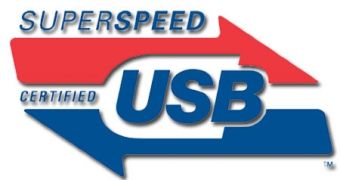The USB 3.0 Promoter Group has just announced that it has started working on a new set of specifications designed to extend the capabilities of the USB interface by enabling it to deliver as much as 100W of power to connected devices.
According to the group, the new specification will coexist together with the USB Battery Charging 1.2 spec as well as with existing USB bus-powered applications.
Furthermore, the specifications will be compatible with both the USB 2.0 and USB 3.0 standard as well as with all the existing cable and connectors.
Devices compatible with the upcoming technology will be able to auto-negociate the voltages and current values they require for charging, or in order to operate, while power can be sent throughout the cable in any direction.
“Building on the rapidly increasing industry momentum for using USB bus power to charge a broad range of mobile devices, the new USB Power Delivery specification extends USB’s cable power delivery capabilities beyond simple battery charging,” said Brad Saunders, USB 3.0 Promoter Group Chairman.
“For example, charging the battery of a notebook PC, or simply powering that notebook PC while actively using the USB data connection, would be possible.
“Conceivably, a notebook PC could rely solely on a USB connection for its source of power,” concluded the group's representative.
The USB Power Delivery specification is targeted for industry review during the final quarter of this year and further information will be delivered at the Intel Developer Forum (IDF), which is scheduled to take place between September 13 and 15, in San Francisco, California.
In early 2012, the USB 3.0 Promoter Group plans to send the final specifications to the USB Implementers Forum for publication. USB-IF is then expected to establish a device compliance program.

 14 DAY TRIAL //
14 DAY TRIAL //